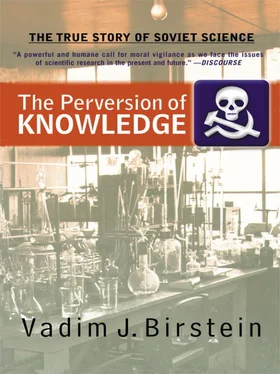This letter explains why and how the Economic Directorate of the NKVD prepared the warrant for Vavilov’s arrest. Evidently, Vavilov’s operational file was kept at the Economic Directorate of the OGPU/NKVD, and authors of the warrant simply used the letter as a draft. In addition, they added some information from the coerced statements of scientists arrested and investigated in 1937–1938. After Vavilov’s arrest it was easy for Khvat and his team to take testimonies of Muralov, Avdulov, and others from Vavilov’s operational file and update them with the testimonies of scientists and officials who were arrested after Vavilov (such as Karpechenko, Flyaksberger, and Bondarenko). 128
During the review of the Vavilov case by the new Military Collegium in 1955 (a part of his rehabilitation), it became clear that some materials in the investigation file were simply falsified by Khvat and other investigators. 129There were copies of transcripts of interrogations of Chayanov, Sidorov, Trifonov, Iordanov, and Zicherman in Vavilov’s investigation file, but no originals were found. Even more obvious was the fact that Vavilov’s file contained a copy of a transcript of the interrogation of Academician Muralov dated August 7, 1940, even though Muralov had been shot in 1937. In its 1955 decision, the collegium stressed the involvement of “the former employee of the NKVD Khvat, on whom the Special Inspection Department of the KGB has materials confirming that he falsified the Investigation Files.” 130
The main goal of investigator Khvat and his team was to force Vavilov to admit he was guilty of the accusations leveled against him. During the first interrogation on August 12, 1940, Vavilov strongly denied everything: “I declare categorically that I had never been engaged in espionage or any other kind of anti-Soviet activity.” 131However, Lieutenant Khvat was quite experienced, and on August 14, he started to interrogate Vavilov during the night, sometimes for ten to thirteen hour sessions. After ten days, on August 24, Vavilov signed his first confession: “I admit that I was guilty of being from 1930 a participant in the anti-Soviet organization of right-wingers that existed in the People’s Commissariat of Agriculture. I am not guilty of espionage activity.” 132As co-plotters involved in “anti-Soviet activity,” he named persons who had already been arrested, tried, and executed: Commissars of Agriculture Yakovlev and Mikhail Chernov, Deputy Commissar Nikolai Muralov, VASKhNIL vice presidents Gorbunov, Moisei Volf, Aron Gaister, Chernykh, Tulaikov, and Meister, and members of the VASKhNIL staff, Secretary Academician Lev Margolin (1895–1938), 133and Khodorovsky. However, Khvat was persistent, and on September 11, 1940, Vavilov confessed to being a “wrecker” and signed a document entitled “The Wrecking [Activity] in the System of the Institute of Plant Breeding That I Directed from 1920 Until My Arrest on August 6, 1940.” 134Khvat stopped interrogations for a couple of weeks. Vavilov was even allowed to start writing a book, History of the Development of Agriculture, in his cell. 135
Then, on September 28, 1940, Vavilov signed another document, “My Organizational Role in the Anti-Soviet Organization in the Institute of Plant Breeding.” 136The interrogations in October–November were not frequent, but evidently they were intense. Vavilov was exhausted, and on December 25 and 27 he wrote more documents: “Testimonies About My Anti-Soviet and Wrecking Activity” and “The Establishment of an Anti-Soviet Connection with the TKP.” 137Although Vavilov had already pleaded guilty of “wrecking,” anti-Soviet activity, and having been the head of anti-Soviet scientists, Khvat continued to ask questions about Vavilov’s international connections with his scientific colleagues and about colleagues at the institute. The interrogation on January 7, 1941, centered around a Bulgarian geneticist and politician Doncho Kostov, whom Vavolov invited in 1932 to work at the Academy Laboratory of Genetics. 138Together with the famous anti-Fascist Georgi Dimitrov, who allegedly was later “killed” by Jewish doctors, Kostov was a co-founder of the Bulgarian Communist Party. In Bulgaria, he was jailed from 1924 to 1929. As a geneticist, Kostov worked in the USSR until 1939; from 1935 to 1939, he headed the Laboratory of Plant Hybridization in the Academy Institute of Genetics.
In 1939, Kostov returned to Bulgaria and led the partisan struggle against the Nazis during World War II. 139In 1942, he was arrested and sentenced to life in prison; his five codefendants were condemned to death. Partisans released Kostov in 1944, and from that time on, he was second only to Dimitrov in the Bulgarian Communist Party.
During the interrogation in January 1941, Vavilov characterized Kostov as a capable scientist. Khvat was interested in Kostov’s connections with Western colleagues and his opinion about the Soviet Union. These questions had a long-term goal: In December 1948, Kostov disappeared from public view, and on July 20, 1949, he was arrested by the Bulgarian MVD on charges of economic sabotage and espionage for imperialist powers. During the investigation, a special method of torture was created for him—he was put in a cell with a small window on the ceiling. From time to time cold water was pumped into the cell. Finally he “confessed.” From December 7 to 14, 1949, he and ten codefendants were “tried” in a show trial. Kostov openly denied all charges. He was condemned to death; others were sentenced to imprisonment. On December 16, Kostov was hanged. Stalin, who personally hated Kostov, was behind the trial that was organized by Stalin’s puppet—Kostov’s Communist Party rival Vulko Chervenkov. 140The minutes of Vavilov’s interrogation regarding Kostov indicate that the arrest of Kostov might have been planned much earlier, in the late 1930s.
During interrogations from December 1940 to January 1941, Khvat also asked Vavilov about Professors Govorov, Karpechenko, Flyaksberger, Levitsky, and other colleagues listed as members of his anti-Soviet group. Evidently, these questions had a particular goal: Khvat was busy preparing warrants for the arrest of Vavilov’s alleged accomplices, Professors Karpechenko and Govorov and a former VASKhNIL deputy president, Aleksandr Bondarenko. Govorov and Karpechenko were arrested on February 15, 1941, 141and Bondarenko, on February 8, 1941. 142
Georgii Karpechenko (1899–1941) was an outstanding plant geneticist. The warrant for his arrest stated that he “had been exposed as a participant of an anti-Soviet plot” and “under the leadership of N. I. Vavilov had conducted an open struggle against the vanguard methods [of scientific work] and the treasured achievements of Academician Lysenko in obtaining high crop yields.” 143These accusations bring to mind the last conversation of Vavilov with Stalin when the dictator referred to “crop yields.” Possibly, an official report about the work of the VIR written by Karpechenko after the arrest of Vavilov and dated September 1940 also played a role in Karpechenko’s arrest. He had plainly stated that the results of experiments performed at the VIR for checking Lysenko’s theories did not confirm them. 144
Leonid Govorov (1885–1941), a botanist and plant breeder, was an old and close friend of Vavilov. Like Pryanishnikov, he could not remain silent after Vavilov’s arrest. He went to Moscow with the intention of meeting Stalin or Georgii Malenkov (a member of the Politburo) to plead Vavilov’s case. Of course, this effort was for naught, as Govorov could not get into the Kremlin. 145He was arrested after he got back to Leningrad and was brought back to Moscow for interrogation.
In 1935, when Bondarenko was the first vice president of VASKhNIL, he wrote a secret letter with the Party secretary of the VASKhNIL, Klimov (later head of the Investigation Group of the NKVD’s Leningrad Regional Department) addressed to Stalin personally, in which they denounced Vavilov. 146The letter claimed that “Vavilov always defends wreckers,” “at the moment he has a ‘minus’ value as President [of the VASKhNIL],” and the like. But the main accusation was that “Academician Vavilov constantly and publicly declares that any [Communist Party] checking of the work of highly qualified scientists is simply offensive and ‘personally unacceptable to him’” (italics in the original).
Читать дальше











